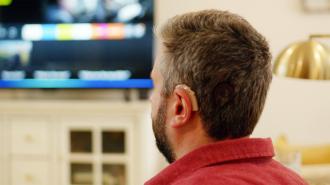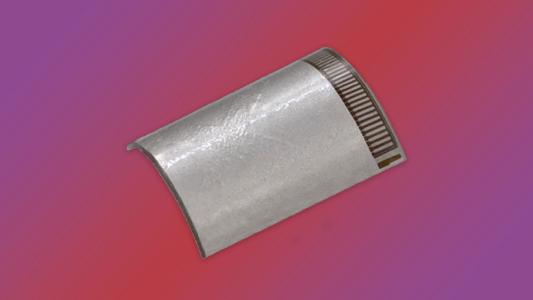For the first time, people with severe hearing impairments will be able to stream audio from smart TVs directly to their cochlear implants — making it far easier for them to understand what’s being said and enjoy streaming entertainment.
The challenge: Cochlear implants use a microphone to pick up sounds in the environment. A speech processor then sends the sounds to a receiver implanted behind their ear, which translates them into electrical impulses that are sent to the brain.
These devices can be life-changing for people with severe hearing impairments — simply allowing them to hear, sometimes for the very first time.
“If I was trying to watch TV, I’d probably be missing out on, say, 40-50% of the words.”
Michael Forzano
Understanding speech on television, though, can still be difficult. Microphones often struggle with converting and relaying sound from speakers.
“If I was trying to watch on the TV in the living room, I’d probably be missing out on, say, 40-50% of the words due to the echoing, the loss in quality, and due to the different voices that you might not be so familiar with,” said Michael Forzano, an Amazon software engineer with a cochlear implant.
What’s new? In 2018, Google unveiled Audio Streaming for Hearing Aids (ASHA), a new protocol that enables people to stream audio from Google’s Pixel smartphones directly to their hearing aids, bypassing the microphones and effectively turning hearing aids into Bluetooth headphones.
Now, e-commerce giant Amazon has teamed up with hearing implant company Cochlear to use ASHA to stream audio from Fire TVs directly to cochlear implants. The service is immediately available to users with supported TVs and implants.
“We send the audio in little packets over to the hearing device,” said Peter Korn, Amazon’s director of accessibility for devices. “The hearing device acknowledges receipt of those packets of audio, and then more are sent, and so on.”
“We also did the work to ensure that this protocol works over living room distances,” he added.
The big picture: There are many models of cochlear implants and even more types of TVs, so not everyone who could benefit from better sound will be able to take advantage of Amazon’s ASHA support.
Still, now that one company has made its TVs easier for cochlear implant users to hear, others could follow.
“Entertainment should be accessible to everyone,” said Korn. “This is one more way to help make that goal a reality.”
We’d love to hear from you! If you have a comment about this article or if you have a tip for a future Freethink story, please email us at tips@freethink.com.






